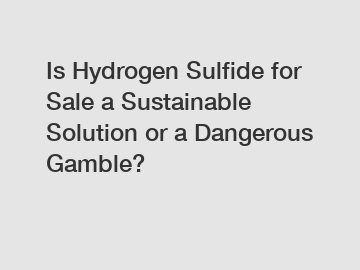Is Hydrogen Sulfide for Sale a Sustainable Solution or a Dangerous Gamble?
In recent years, the concept of sustainable energy has gained immense traction as the world grapples with environmental issues and dwindling fossil fuel reserves. Among the many alternative solutions that have emerged, hydrogen sulfide (H2S) has managed to capture attention for its potential as a sustainable energy source. However, the use and sale of this compound come with certain risks and challenges. In this blog post, we will explore whether hydrogen sulfide for sale is a sustainable solution or a dangerous gamble.
The Promise of Hydrogen Sulfide:
Hydrogen sulfide, a colorless gas that occurs naturally in certain geological formations, has been recognized for its energy potential. When burned, H2S releases clean energy and produces only water vapor as a byproduct, making it an appealing candidate for sustainable energy production. Additionally, hydrogen sulfide can be synthesized through various chemical processes, further enhancing its potential as a renewable energy option.

Sustainability Factors:
1. Renewable Resource: One of the primary arguments in favor of hydrogen sulfide as a sustainable solution is its availability. The compound is found naturally in large quantities, especially in geothermal areas and oil fields. As long as its extraction is conducted responsibly, hydrogen sulfide offers a virtually infinite resource for energy generation.
2. Clean Combustion: Hydrogen sulfide combustion results in the production of water vapor, eliminating the release of harmful emissions such as carbon dioxide, sulfur dioxide, or nitrogen oxides. By reducing greenhouse gas emissions, hydrogen sulfide can contribute significantly to mitigating climate change and improving air quality.
Challenges and Risks:
Additional resources:What is Sulfur Dioxide (SO₂)?
What is the use of sulfonyl chloride?
Which grade of HPMC is best?
The Phenol Alkylation Plant Revolutionizes Chemical Industry
Tantalum-Tungsten Alloy: The Best Choice for High Strength and Toughness Materials
What is methyluracil ointment used for?
Unlocking the Potential of Isobutane: A Comprehensive Guide
1. Toxicity and Safety Concerns: Despite its potential, hydrogen sulfide has its risks. It is highly toxic, affecting the human respiratory system even at low concentrations. Special precautions and safety measures are necessary during its handling, storage, and transportation. Ensuring proper safeguards throughout the supply chain is essential to avoid any potential harm.
2. Environmental Impact: While hydrogen sulfide combustion results in clean energy, the extraction process can have environmental consequences. Uncontrolled release of H2S can contaminate groundwater, affect ecosystems, and harm biodiversity. Responsible management and strict adherence to environmental regulations must be in place to mitigate these risks.
3. Infrastructure Development: The widespread adoption of hydrogen sulfide for energy production requires substantial infrastructural development. This includes the construction of storage facilities, transport networks, and power plants capable of harnessing this resource efficiently. The financial and logistical requirements for establishing such infrastructure may pose challenges to its wide-scale implementation.
Conclusion:
The availability of hydrogen sulfide as a source of clean, sustainable energy presents an intriguing possibility for our future energy needs. However, the risks and challenges associated with its handling, safety, environmental impact, and infrastructure development must be addressed diligently. Strict regulations and responsible practices are essential to ensure the sustainable use of hydrogen sulfide as an energy source. Only through careful management and continuous advancements in technology and safety can we harness its full potential.
In our pursuit of sustainable energy solutions, it is crucial to assess the viability of resources like hydrogen sulfide in a holistic manner, considering their impact on the environment, human health, and long-term sustainability. As innovations and safety standards progress, hydrogen sulfide may indeed become a valuable addition to our renewable energy portfolio. But until then, it remains a field that requires thorough research, investment, and responsible implementation to ensure we do not sacrifice safety for sustainability.
If you are looking for more details, kindly visit refrigerant gas supplier, no2 specialty gas, d2 specialty gas.
Additional resources:Applications of Matting Powder in Leather Products
The Role of the Methyl Acetate Plant
Elevate Your Interiors with Luxurious Velvet Effect Wall Paint
Sodium Cumene Sulfonate: Unveiling the Versatile Surfactant
What is the purpose of anti rust lubricant spray?
What are the advantages of PU adhesive?
WHAT ARE THE PROPERTIES OF SURFACTANTS?
75
0
0
Related Articles
-
154
0
0
-
151
0
0
-
158
0
0
-
148
0
0
-
Xylitol vs. Erythritol, What Are You Concerned about?
Here are some FAQs about Erythritol. We share them with you.
150
0
0
-
151
0
0
-
139
0
0
-
128
0
0









Comments
All Comments (0)